Movie Review – Lorax, The
Dazzlingly animated, occasionally heavy-handed environmental themed story about consumerism, The Lorax is bright, bubbly fun for all ages, with enough subtle humor for the adults and plenty of amazing visuals to keep the kiddies keen. While it often feels somewhat belaboured by plot, the film still enthuses about its core themes of corporate monopolising greed to the point where you can kinda see how its going to end up. Folks familiar with Dr Seuss’ story will delight in seeing it on the big screen, while new fans will be kept laughing at the same time – much like Horton Hears A Who, The Lorax lengthens the original story to fill a feature and does a damn fine job of it.
– Summary –
Director : Chris Renaud & Kyle Balda
Year Of Release : 2012
Principal Cast : Voices of Zac Efron, Rob Riggle, Danny DeVito, Ed Helms, Taylor Swift, Betty White, Jenny Slate, Nasim Pedrad, Stephen Tobolowski.
Approx Running Time : 86 Minutes
Synopsis: After living in Thneedville his entire short life, young Ted decides to find a real life tree to impress his female crush, and learns along the way why Thneedville is made entirely of synthetic materials.
What we think : Dazzlingly animated, occasionally heavy-handed environmental themed story about consumerism, The Lorax is bright, bubbly fun for all ages, with enough subtle humor for the adults and plenty of amazing visuals to keep the kiddies keen. While it often feels somewhat belabored by plot, the film still enthuses about its core themes of corporate monopolizing greed to the point where you can kinda see how its going to end up. Folks familiar with Dr Seuss’ story will delight in seeing it on the big screen, while new fans will be kept laughing at the same time – much like Horton Hears A Who, The Lorax lengthens the original story to fill a feature and does a damn fine job of it.
**********************
Save The Forests, Don’t Buy Stuff.
Hollywood’s continual desire to mine children’s books for the next motion picture seems to be paying off – at least as far as fans of Dr Seuss are concerned. Four major features in, and the successes outweigh the failures. The Grinch was an enormous success (even with Jim Carrey’s off-kilter approach now the subject of much online derision), Mike Meyer’s scathingly bad live-action Cat In The Hat debacle killing that character off for a generation of children, and the wonderfully, delightfully animated Horton Hears A Who (with Jim Carrey’s voice-work as Horton actually proving entertaining) bringing the acclaimed author’s work to the big screen and new audiences. The Lorax, based on Seuss’ enviro/commercialism centric story, is expanded from the few pages of text provided into a full-blown feature, with a couple of new characters and a definite change in tone from the original work, making the story more accessible to modern audiences with short attention spans. Does The Lorax succeed with its modifications, or does the sensitive theme of the film prevent it from becoming an outright hit?
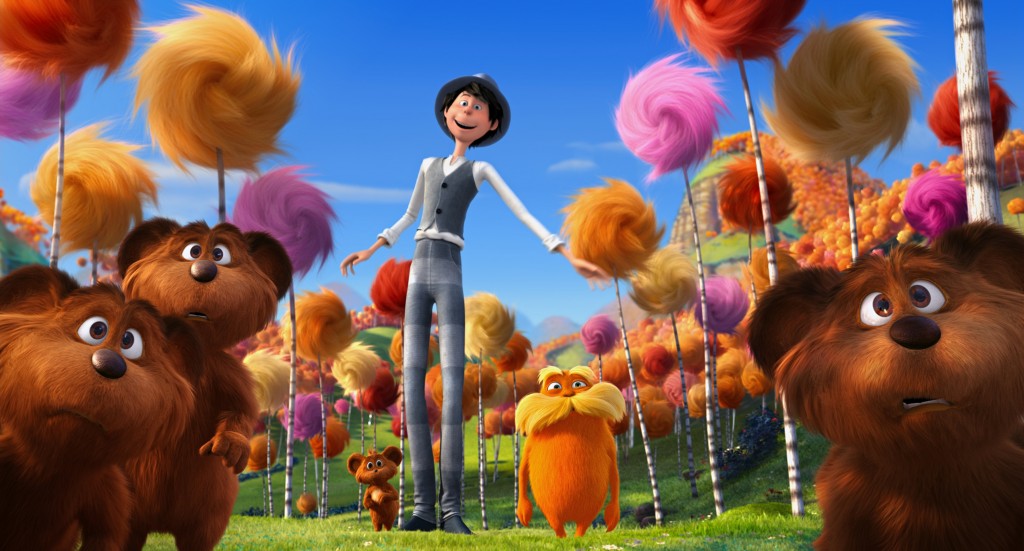
Ted (Voice of Zac Efron) lives with his mother (Jenny Slate) and Grams (Betty White) in Thneedville, a walled city that is practically utopian in appearance; there isn’t a skerrick of nature anywhere – trees and plants are plastic, while buildings are manufactured from metal, plastic and other synthetic materials. Fresh air is provided to the citizens of Thneedville by Mayor and entrepreneur Aloysios O’Hare (Rob Riggle), ostensibly quite accommodating as long as nobody investigates his business practices. Ted has a crush on Audrey (Taylor Swift), who states that she’ll marry the person who brings her a real, live tree – something not seen in Thneedville in many a long year. The city is protected from the harsh world by an enormous wall – something Ted must overcome if he’s to leave Thneedville in search of the mysterious Once-ler, a being who knows where Ted might find a tree with which to impress Audrey. The Once-ler (voiced by Ed Helms), begins to relate to Ted the story of how he came to a beautiful paradise to start up his own business, using the leaves of the eponymous Truffula Trees, which grown in copious quantities and are incredibly soft. Using these trees, the young Once-ler creates an item known as the Thneed, which can be used in multiple ways, creating himself a product which is valuable and marketable. It means chopping down many, many more Truffula Trees, something which raises the ire of a short, orange creature known as the Lorax (voice of Danny DeVito), who “speaks for the trees” because they can’t speak for themselves. The Once-ler doesn’t listen to the Lorax, ending up creating such a powerful market for the Thneeds, that he eviscerates the forest of Truffula Trees until they’re all gone – the market collapses, and the Once-ler goes out of business. Ted’s activities with the Once-ler haven’t gone unnoticed, with O’Hare trying to prevent the lad from undermining his monopoly on Thneedville’s air by planting a tree (which will provide oxygen to the city for free) – and he’ll stop at nothing to protect his interests.
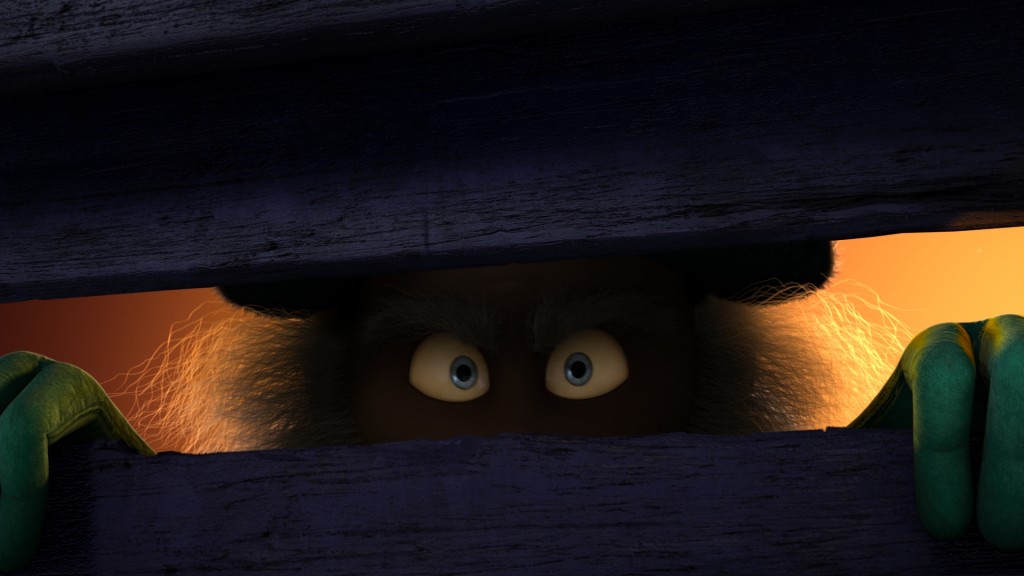
The Lorax was, and is, a story of self-interest. It’s an environmental message film, as well as a dialogue on consumerism and commercial greed. The fundamentals of Dr Seuss’ razor sharp text might be a little more obscure in this feature film, thanks to a secondary story plot involving Ted, Audry, and the evil of O’Hare, but the overall potency of its underlying message isn’t lost at all. It struck me as I watched this that the Lorax himself doesn’t really appear all that much – the film centers primarily around the Once-ler, and Ted (who is the unnamed protagonist in Seuss’ original book), making the film’s title somewhat misleading. What also struck me is just how lifeless the Lorax actually is; as a character, he’s limited in emotional content, and lacks a genuine sense of himself within the context of the film. His motivations are sketchy at best, and his temperament changes from minute to minutes depending on the needs of the story. His belated friendship with the Once-ler is never built upon, nor is their eventual estrangement. As the central figure in this tale, Dany DeVito’s Lorax is somewhat underwhelming. Ted, voiced by Zac Efron, and The Once-ler, voiced by Hangover star Ed Helms, are the two primary story focus points here, with more subtlety to their characters, allowing audiences to empathize with them – even though the Once-ler goes completely mental with greed, we still feel his rationale as legitimate thanks to the piles of money he’s making; it’s wrong, but understandable.
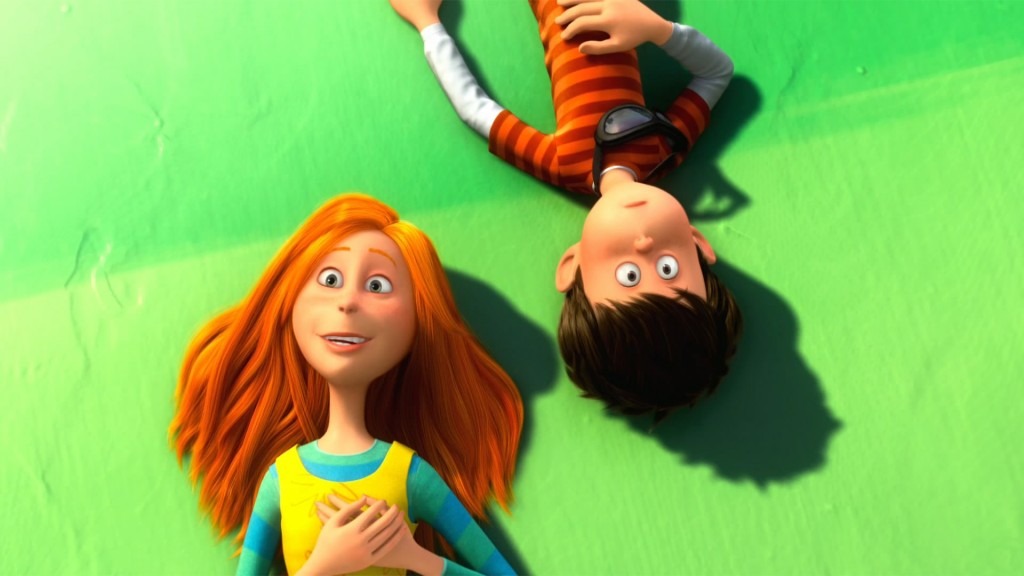
The primary message of the film – about chopping down trees, ruining the environment, and a tacit reminder about corporate monopolies being bad – run front and center in The Lorax. The script makes no pretense about trying to hide the obviousness of what the story is about, and I would posit that even those few folks unfamiliar with the story would see the outcome coming a mile away. This lack of tension within the script is counter-weighted by a funny, often barbed sense of humor that elicits more than a few chuckles. It’s not the smartest script ever written, but it’s a cut above mediocre, definitely. The addition of several new characters seem to fit seamlessly into the Seuss world, although of all of them, it’s O’Hare who feels the most “modern”. While the story’s two-pronged social commentary might rub some the wrong way, or come across as a little preachy, it’s my opinion that the films fast paced humor provides enough momentum to keep the “morals” from dragging things down.
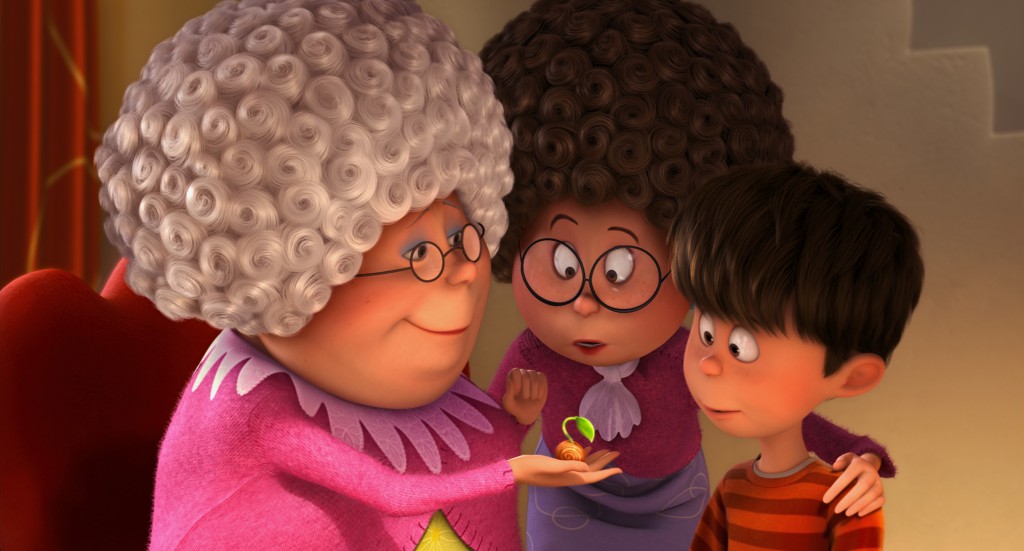
On the casting front, Zac Efron isn’t as annoying as I expected him to be, while Taylor Swift is vocally sexy-as as Audrey, the Girl Next Door. Rob Riggle portrays O’Hare with a distinct lack of menace (the character looks like a male version of Edna from Pixar’s The Incredibles, so I kept waiting for an exclamation of “Daaaaahlings”!), while DeVito feels like he’s lost in amongst the better characters as the Lorax. Exactly what the Lorax is, or does, aside from say “stop chopping down the trees,” is indeterminate, and this creates a narrative problem for a film centered around him. Betty White is as hilarious as ever as Grams, while Ed Helm’s solid work as the Once-ler is comically modern while at the same time, suitably Seussian. While I doubt you’ll find better voice casting elsewhere, the strength of the film lies less in the voices and more in the script.
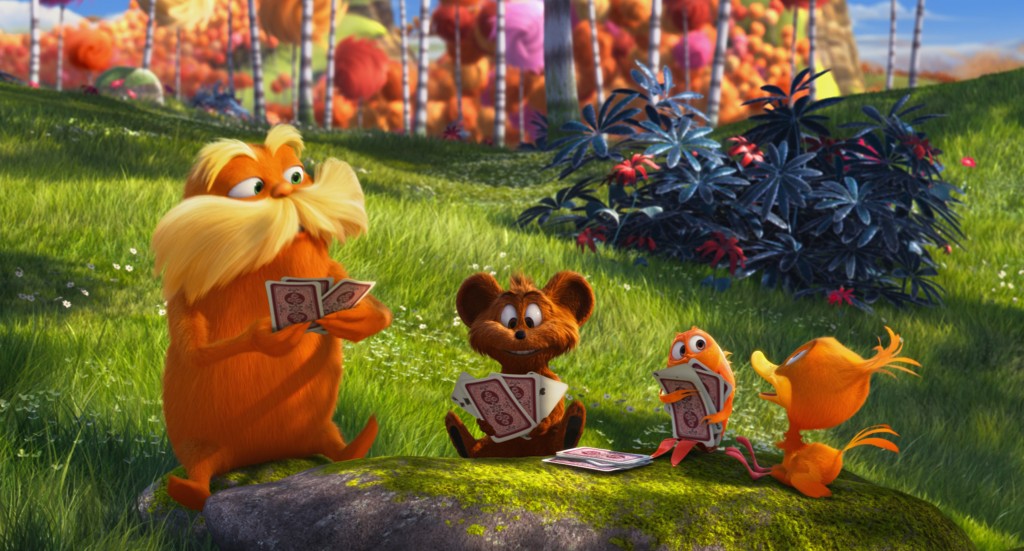
Easily the most astonishing aspect of this film is the animation. Sure, we harp on about how amazing all these animated films are to look at, with their bright colors and fancy visual effects, but The Lorax is indeed a bright, bubbly film experience largely thanks to its riotous color design. The world of Thneedville is yet another riff on Seuss’ art design, and look a lot like The Grinch’s Whoville, or Horton’s Whoville, in that sense of whimsy and fantasy. The desolate landscape of the ravaged world around Thneedville is dark and depressing, although it is still gorgeously rendered. The pre-Truffula-extinction paradise found by the Once-ler is a dazzling plethora of color and movement, taking Seuss’ original artwork and enhancing it by several orders of magnitude. The animals Seuss introduced to us – the fish, bears and birds, are all present, given living, breathing life by the artists involved. The Lorax is nothing if not a beautifully animated film – it’s become a cliche, I know, but it’s as true here as it ever was.
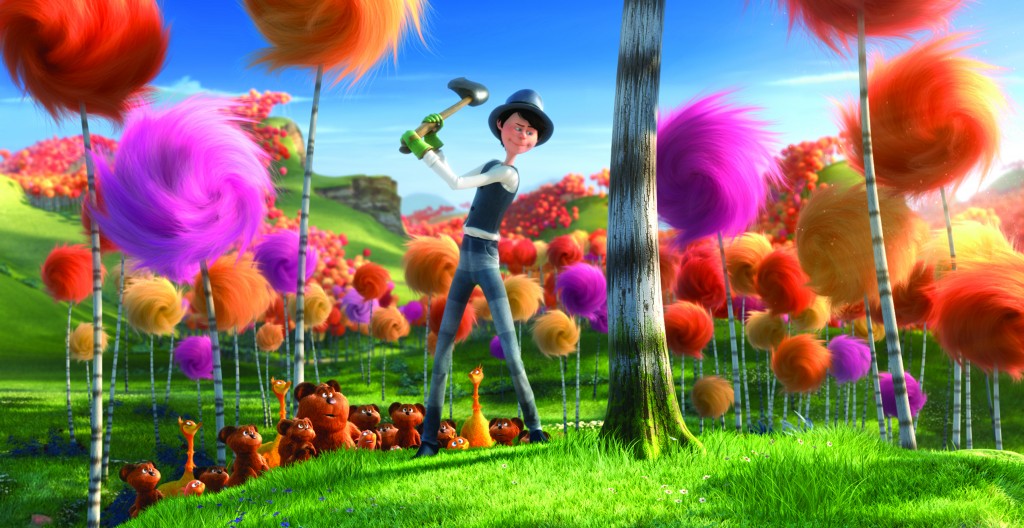
It might interest you to know that The Lorax has been turned into something of a musical. With a trumpetous opening number about just how awesome Thneedville’s lack of nature actually is, to the Once-ler’s diatribe on the benefits of corporate greed, to the positive energy of having a Thneed; John Powell’s entertaining score might not be revelatory, but it’s eminently serviceable. I know I’ll be humming “Thneedville” for a few more days yet. While the songs are hardly the stuff of cinema legend, they’re good enough to make me tap my foot, and keep the kids bopping along as well, even if they’re not entirely cognoscente of the meaning to them.
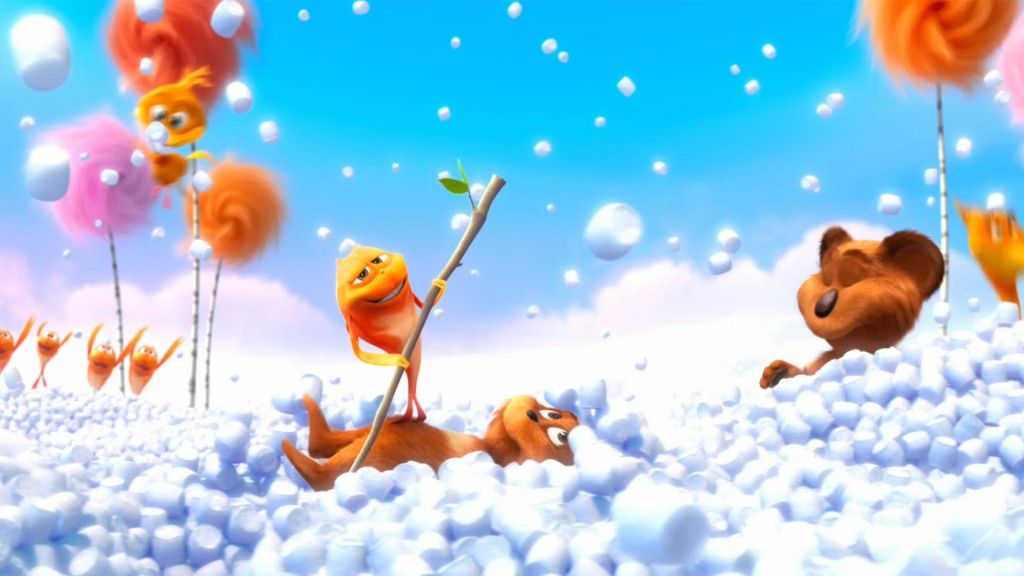
I really enjoyed The Lorax, and as much as I wanted to find huge faults with it, what faults there are are plastered over by an energetic fervor that’s infectiously prodigious. The character of the Lorax, the title character, mind you, is the weakest part of the film, which is something of an indictment, and the anemic nature of the film’s central villain, O’Hare, doesn’t quite solidify the tension for Ted’s dramatic arc; the overall feeling of fun and knockabout fantasy, however, can’t be overstated. The Lorax is highly entertaining, and even if it’s not terribly deep dramatically, the core message about commercialism and greed remains as true now as it did in Seuss’ original book.


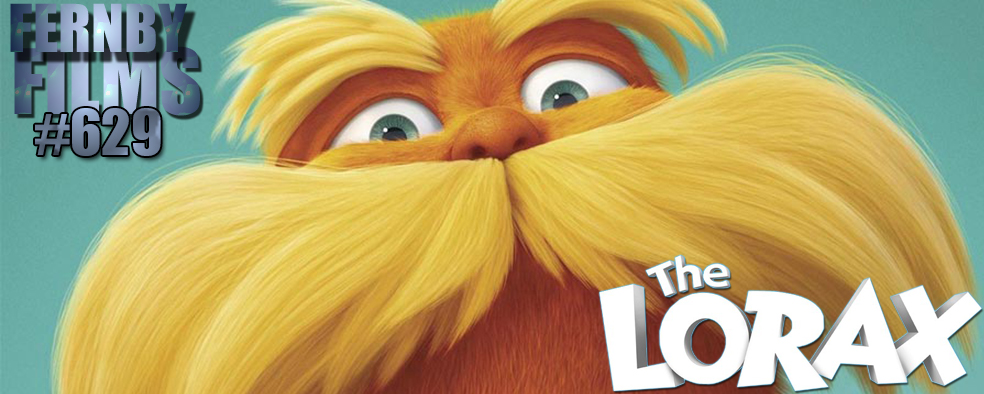
 The Lorax (2012)
The Lorax (2012)





Good review Rod. It was sweet enough to work and even get me a bit teary-eyed at some spots. Only some.
My recent post Valhalla Rising (2009)
Really? Hmm….. you might need a cup of concrete mate – harden up a bit…. LOL!!!! 😉
I jest, of course. There are moments in this which do hammer the heartstrings a bit, but for some reason I was largely unaffected by it.
I wasn't expecting too much of this movie, but thoroughly enjoyed it. I guess all the bright colors really helped that…. 😉
My recent post SOMM (2012)
It's the kind of film you need to watch with sunglasses on, isn't it!!! Thanks for stopping by, Nostra!!